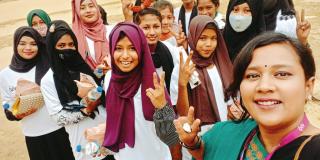
Rukaiya Siddika is a national volunteer in Bangladesh, working to empower women who live in refugee camps in Cox's Bazar. Cox’s Bazar is home to the world's largest refugee camp and houses almost 1 million Rohingya refugees. Volunteers like Rukaiya are using technology to empower women living in the camps to learn new skills in ICT.
About me
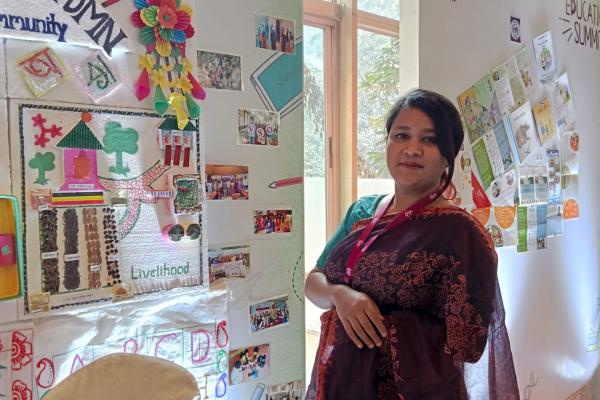
"My name is Rukaiya and I have a background in computer engineering and recently completed my Masters in Sanitation Engineering. While this is my first professional volunteer experience, I also volunteered all through my university years, especially campaigning to encourage blood donation – and I’m an active donor myself.
Finding community
I’ve always been very independent. When I was three years old, my parents would leave for work, and I vividly remember waking up in the morning to an empty house.
In places like Bangladesh, where children and adolescents live alone, the lack of connection with parents can lead to pressure and loneliness. Growing up, I felt so alone. I had no one to talk to, I didn’t get any quality time with my parents. When I left school, I moved to a city and lived alone there too. Living independently allowed me to interact with friends, and as I made myself comfortable in a whole new community, it dawned on me that engaging more fully could help make it better for everyone.
Given my family's financial constraints, I needed to find a job to support myself. I began searching for opportunities and was fortunate enough to receive a scholarship from the Bill and Melinda Gates Foundation, in collaboration with a university in the Netherlands, but the scholarship funds of course didn’t last forever.
I was still pursuing my master's degree and facing a deep financial crisis; that’s when I discovered a volunteering role with VSO that aligned with my skills and experiences. The position was for someone to help women in the Cox’s Bazar refugee camp with their ICT skills. It mentioned a living allowance, which would keep me afloat, but it was also an opportunity to mix together all my experience in computer science and engineering, sanitation, emergency contexts, and volunteering. It seemed like the perfect fit. I didn't need much else besides food, shelter, and the chance to work.
Empowering transformation
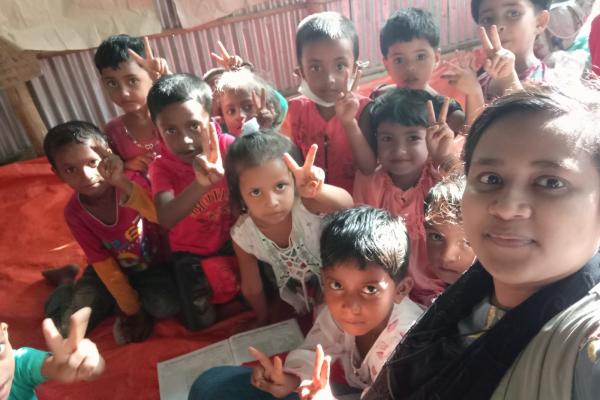
I started the project with the objective of empowering women in the community and helping them learn about technology without any cost. The women in Cox's Bazar face a lot of barriers and restrictions. The community is very religious and male-dominated, and husbands and fathers played a significant role in limiting women’s freedoms. Some even told me that, though their husbands had a smartphone, they would be beaten if they touched it. My goal was to help them use technology to establish their own identities and help them break free from these oppressive situations.
Over time, I have witnessed positive changes in the community. Initially, the women were hesitant to leave their homes and only attended the learning centre briefly as community volunteers to teach the children, then go straight home. Now, they are eager to come and learn for themselves. I provide training and resources on using tablets, technology, and various interactive tools and, as well as gaining confidence with technology, the women are also gaining confidence to manage their husbands and families.
In terms of impact, one area where I feel I have made a significant difference is in empowering women in the community to embrace technology. Initially, the women in my facility struggled to use even basic technology like tablets. They were unfamiliar with rotating the screen or operating such devices. Witnessing their transformation, where they can now confidently use tablets and access content independently, fills me with joy. They no longer require my assistance to navigate these technologies, as they can explore and learn on their own.
Changing perceptions of gender
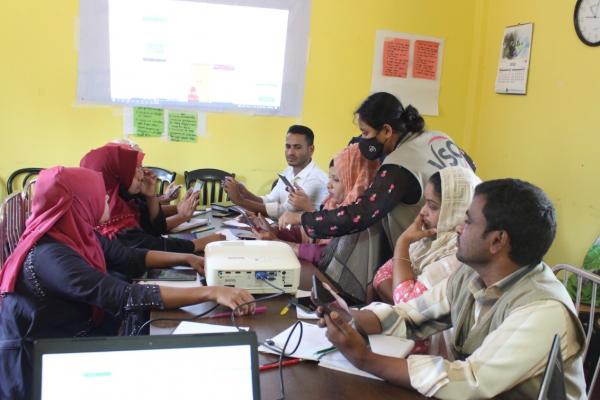
Men have also shifted in their attitudes. I think when women are confined to their homes, there’s a lack of respect. Men may see them as incapable of doing the same things they can. However, as the facilitators started attending the centres, earning an allowance, and evolving with technology, their husbands began to see a change. They started feeling respected and proud when they can say their wives or daughters are using technology; they tell their friends that they can now call her or send her a friend request, strengthening their place in the community even more. People no longer view women as less capable, but as community members with valuable knowledge and skills to contribute.
One specific example is a woman and community volunteer named Moshe. She was one of the women whose husband would beat her for trying to learn, but Moshe was very smart and determined. We provided support, I told her she could just tell me about whatever problems she had, and I would help her find solutions. Now she confidently uses technology, and her husband actually supports her – he even comes and talks to me about her progress and how to help.
Growth and skills
Over my volunteer placement, I can confidently say that I have undergone significant personal and professional transformations. In the past, I often felt nervous talking to people, fearing their judgment and acceptance. But through this role I’ve learned how to communicate with people – even in more challenging situations, such as adapting to communicate with people with disabilities, or getting through to people who don’t want to hear what you have to say. I have gained the skills and confidence to conduct training sessions, establish ground rules, and manage teams – as well as expanding my technical skills in content development, including video and photo editing, which were entirely new skills for me.
VSO’s blended volunteering approach
VSO’s blended volunteering approach is fascinating to me. Mixing different perspectives and involving diverse community members, we can create an inclusive space, where mothers, fathers, and children from the community are involved, and ensure that no one feels excluded. In my community centre, I have made efforts to incorporate children with disabilities, adapting content and activities to their needs, so they also feel included and valued.
While I haven't worked with international volunteers in person I have had the opportunity collaborate online. One volunteer, Jean, an expert in Early Childhood Development, was incredibly helpful in helping me understand the training content. When I struggled with the written modules, we’d meet online and talk it through – her guidance and support was especially valuable.
Why volunteer with VSO?
For anyone considering applying or signing up as a volunteer for VSO, I would highly recommend it. You’ll learn so many new things in such a flexible, inclusive, and supportive environment where you can freely share your thoughts and concerns. One aspect I particularly appreciate is the ability to directly communicate with the global team; whenever I encounter a problem or need support, I can reach out to them through online collaboration tools. As a woman, VSO’s commitment to women and girls’ safety, and zero tolerance towards violence, is very important to me – I feel safe and secure to be able to do my work.
In my previous experiences and from hearing others' stories, there are lots of places where you don’t feel you can share your worries or concerns with higher management. With VSO, I can share everything with my boss; I can call and say I’m not feeling okay and, whether I just need to take 10 minutes or a whole day to rest, there will be that flexibility. That’s a big thing for me.
Outside of work, I love the sea. Whenever I go fishing, I sit by the sea and think about what good I’ve done in the world today, and what could have been better. I love learning, so I’m always reading, taking courses and improving that way. But when I’m reflecting on my day, I more often think I could have smiled a little more. I could have been softer, more positive, and met people with a more smiling face. So now that’s my drive – to make others smile.
What makes VSO special?
VSO's approach to improving people's lives lies in the transformative power of volunteers from different cities and countries who join new communities. Their presence and dedication inspire community members to take pride in their own development, fostering a sense of motivation and collaboration. By working together with the volunteers, the community evolves and progresses, ensuring sustainable growth even when the volunteers are no longer present. VSO's focus is on engaging and developing the community, making lasting impacts on their journey towards self-improvement.
Within a community, people can get stuck in a mindset of, "this is just how things work here", and whether or not they choose to take part, they might not speak up.
But when VSO volunteers from different cities or countries join a new community and begin working for it, there’s a big motivation for the rest of the community to get involved. They think, if an outsider can contribute, develop the community, and take pride in their work, then why can't they?
VSO volunteers’ main role is really in getting people involved in their own development, because volunteers will leave one day, so the responsibility for the community’s progress lies their own hands."
About Rukaiya
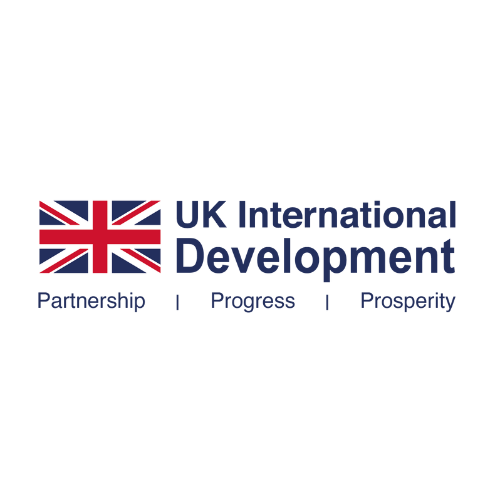
Rukaiya Siddika is a National Volunteer and ICT in Education Specialist at VSO who works on the Education in Emergencies (ECCE) programme in the Rohingya refugee camp in Cox's Bazaar, Bangladesh. The programme aims to provide accessible education support for Rohingya children through a learning centre, life skills training and Sexual Reproductive Health and Rights (SRHR) activities.
Rukaiya develops digital content for the VSOSchool App and supports young community volunteers who offer education support to children aged three to five in their homes, promoting emotional development and teaching them the basics of literacy and numeracy.
Volunteer with us
Inspired by Rukaiya's story? Explore our latest volunteering opportunities to find out how you can use your skills to make a lasting change through volunteering.
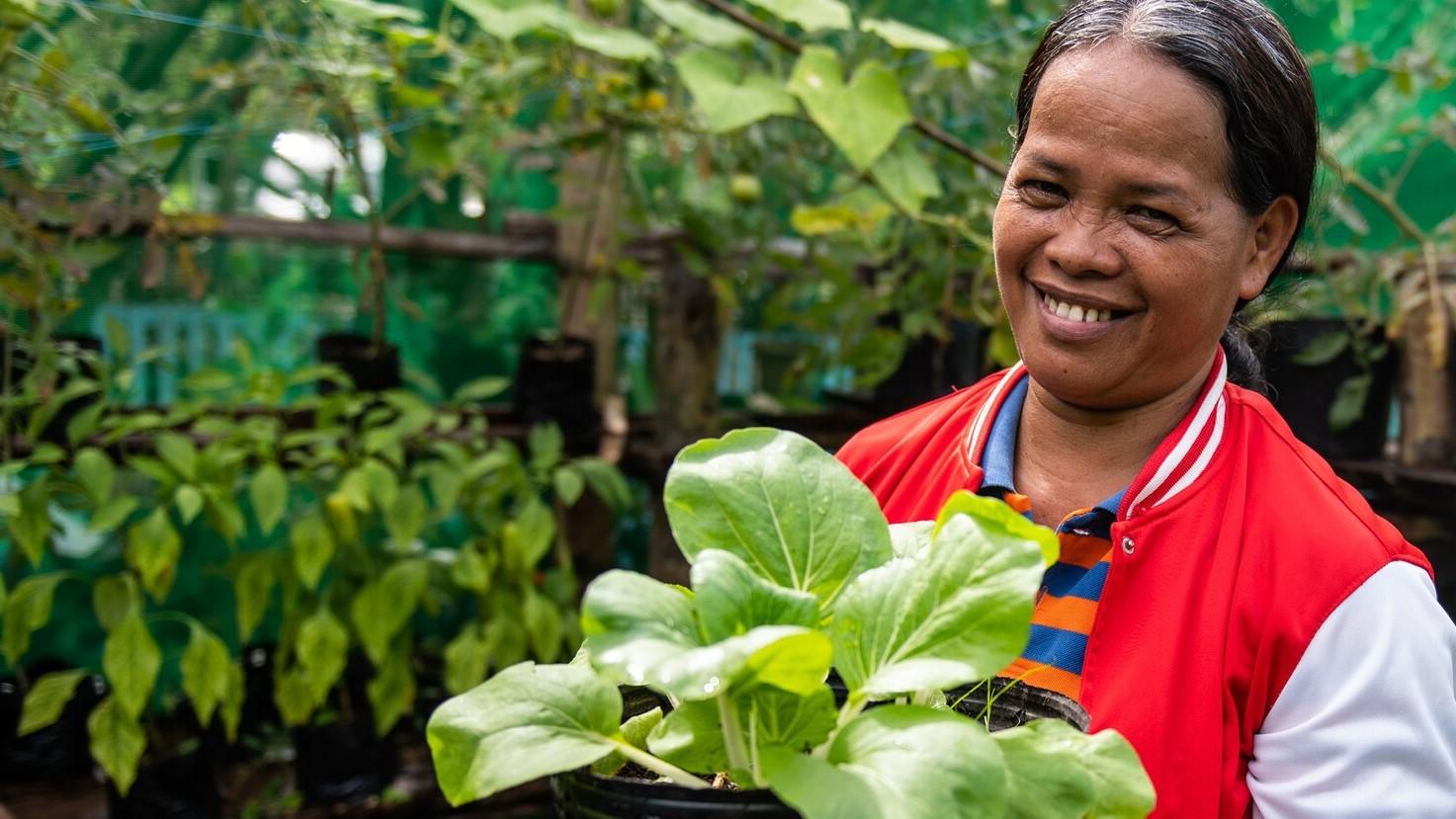
Support us with a donation
Read more
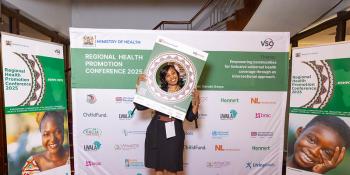
In photos: Our Regional Health Promotion Conference 2025
Check out some of our favourite photos from Regional Health Promotion Conference (RHPC25). This event sought to reimagine Universal Health Coverage through the lens of intersectionality.
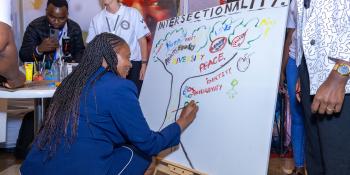
Using intersectionality to create healthy beginnings and hopeful futures
World Health Day brings global attention to the urgent need to end preventable maternal and newborn deaths. Learn more about how our Regional Health Promotion Conference is tackling these issues head on.
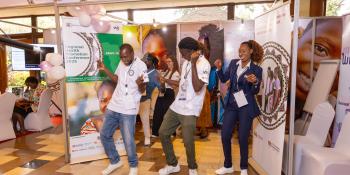
Highlights from the Regional Health Promotion Conference 2025
The Regional Health Promotion Conference 2025 reimagined Universal Health Coverage (UHC) through the lens of intersectionality, by bringing together experts from across East Africa and beyond.
